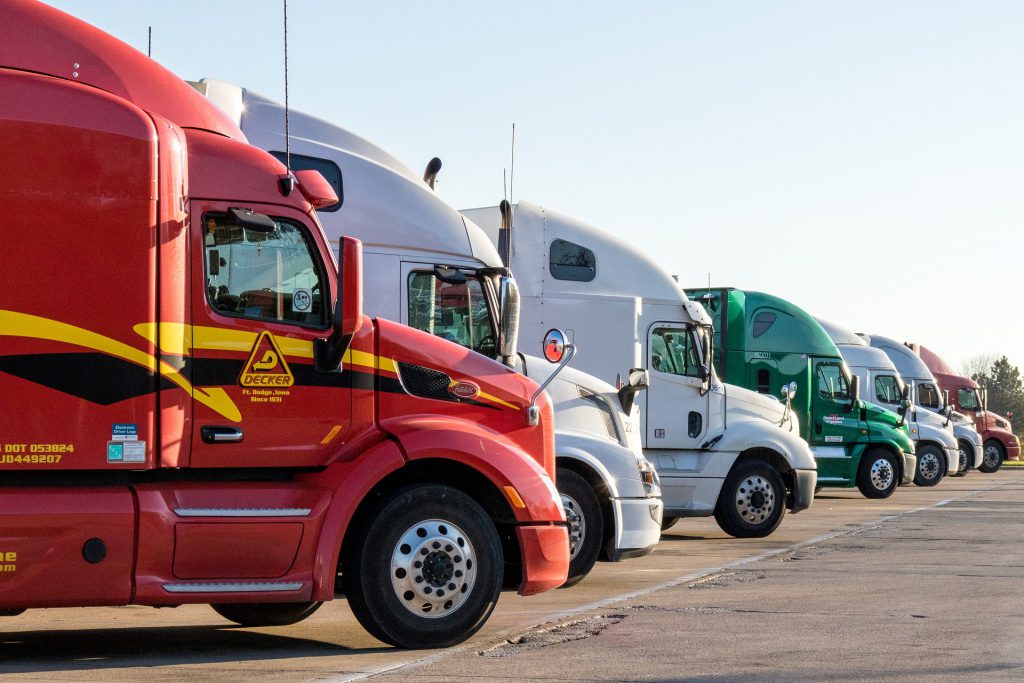The Myth of the Truck Driver Shortage
GOP bill raises question: Is there a shortage of trained drivers or do companies need to pay more?
Republican lawmakers have been convinced the state needs more truck drivers and rather than waiting for the free market to solve the problem, as conservatives of yore would have insisted, have decided they have the solution: to essentially subsidize the industry.
The bill would require the state Department of Transportation to offer scholarships paying up to 50 percent of the cost of tuition for commercial driver training programs and would provide grants of $500 to individuals and trucking companies if graduates of these programs stay with their employer for more than a year, as Wisconsin Public Radio has reported.
Those scholarships are needed, these groups noted, because the nation faces a shortage of 80,000 truck drivers, according to the American Trucking Association.
Observers might wonder how a Wisconsin program can address a nationwide shortage like this, but that’s only the beginning of the problems with this proposal. Dan Johnson, vice president of the Wisconsin Motor Carriers Association, let the cat of the bag when he noted the shortage goes back years and admitted what sounds like a classic supply-and-demand issue, “that drivers are moving from one company to the next based on benefits, compensation, whatever they’re offering as incentives.”
In short, companies who pay more are attracting more workers, a concept thoroughly covered in Economics 101.
As for the idea of a truck driver shortage, if anything there is an oversupply. As a story in Time reported: “in California alone, there are 640,445 people who hold active Class A and Class B commercial driver’s licenses, according to the Department of Motor Vehicles. Meanwhile there are only 140,000 ‘truck transportation’ jobs in the state, according to the state Employment Development Department.”
“It’s pretty simple,” added Joe Michel, executive director for the Alaska Trucking Association: “Pay them more, treat them better, they’ll stick around.”
As a story in Forbes noted, truck driving is “a grueling way to make a living. You’re on the road most of your life. If you have a family, you don’t see them for months at a time. Stopping at small rest stations, local diners and low quality motels leave the driver susceptible to catching COVID-19. The trucker is then stuck in some small town in the middle of the country, far away from family and friends to help take care of them… Many truckers also bear the burden of gas, insurance and maintenance costs, which reduces their take-home pay.”
In fact the pay for truck drivers has been declining for decades. Total employee compensation fell 44% between 1977 and 1987, as Steve Viscelli, a University of Pennsylvania sociologist and author of the book The Big Rig: Trucking and the Decline of the American Dream, told Time. “Today, drivers get paid about 40% less than they did in the late 1970s, Viscelli says, but are twice as productive as they were then.”
All of which helps explain why there is massive turnover of truck drivers, who try the job and then quit. “Turnover for truck drivers in fleets with more than $30 million of annual revenue was 92% at the end of 2020, meaning roughly 9 out of every 10 drivers will no longer be working for that company in a year,” Time reported.
So why don’t trucking companies simply pay workers more? Wisconsin’s leader in the industry, Schneider National, is a $4.6 billion company that has plenty of money to pay its top five executives, who together earned $11 million in 2020, led by CEO Mark B. Rourke, who took home more than $5 million. They would argue they must be paid this astounding level of compensation because the market requires it. But when it comes to a shortage of drivers, they won’t pay enough to get the steady drivers they need. Instead they are asking for the state to subsidize private training programs for workers.
But it is not just about decisions by trucking companies. As Time noted, “it’s not easy for trucking companies to just pay drivers more. If they tell a major retailer like Walmart that they’re raising the cost to haul a load, Walmart will only find a trucking company that can do it for cheaper.”
The Wisconsin Republicans’ approach to the problem of trained drivers refusing to work for bad pay and working conditions was already tried by California, which spent millions to help train yet more drivers, only to find that most graduates never joined or stayed in the industry. Now the state has tried something else, passing a landmark bill targeting the gig economy and which reclassifies truck drivers from independent contractors to employees. That might force companies to stop exploiting workers. But first the courts will have to rule against the California Trucking Association, which has filed a lawsuit challenging the law. Needless to say, there won’t be any such law proposed by Wisconsin’s Republican legislators.
If you think stories like this are important, become a member of Urban Milwaukee and help support real, independent journalism. Plus you get some cool added benefits.
Murphy's Law
-
The Last Paycheck of Don Smiley
 Dec 17th, 2025 by Bruce Murphy
Dec 17th, 2025 by Bruce Murphy
-
Top Health Care Exec Paid $25.7 Million
 Dec 16th, 2025 by Bruce Murphy
Dec 16th, 2025 by Bruce Murphy
-
Milwaukee Mayor’s Power in Decline?
 Dec 10th, 2025 by Bruce Murphy
Dec 10th, 2025 by Bruce Murphy























Bad pay and hard grueling work for others while giving away tax dollars to rich corporations with greedy execs.
Republican con game at work.
Never let the facts get in the way of an industry sponsored raid on the people’s money . . . .
The Repubs never seem to change their game plan and yet, everyone appears to go along without a peep.
This is just another handout for business by the Republicans who state that they don’t like handouts. The Party often wants applicants for State health care or unemployment to take a drug test. To be consistent, a drug test should have to be done by anyone applying for this grant.
Remember when Governor Scott Walker claimed that there was a shortage of welders?
Then Walker created 1-2 year welding programs in all the technical colleges.
When the welders finished school and looked for jobs, there were none available.
Interesting story! Completed changed my thinking on the truckers issue……
There is a shortage of truck drivers willing to work for peanuts.
Hey, the real problem is that there aren’t enough 18 year olds driving “big rigs”. One bullet point on the “Joe Malarkey, Kamala Harris Trucking Action Plan; “Launching the Safe Driver Apprenticeship Pilot –an under-21 pilot program for truck drivers mandated in the Bipartisan Infrastructure Law”. (It’s on the USDOT website, not the Onion website so I think it’s for real). Another bullet point “Beginning two studies to explore the issues of truck driver pay and unpaid detention time”. It’s the favorite tool in the corporate Democrat tool box; do a study of the problem rather than actually try to solve the problem!
Grants and scholarships for the teacher shortage might change that trend.
why don’t you include some relevant data relating to what Schneider pays their drivers or their turnover rates, or any other data on pay or turnover based on drivers in wisconsin?
Is the growth of Amazon & other distributors in SE Wisconsin eating up the supply of WI drivers?
The city of Milwaukee DPW has a shortage of drivers & Ald Marina recently proposed spending $$$ to address the shortage. I’d imagine she supports this legislation?
Would have been nice to see some local insight & opinions instead of quotes from someone in Alaska & a handful of cut/paste from Times & Forbes.